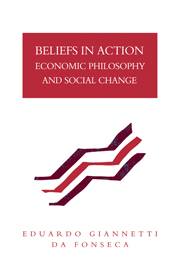PART II - PATTERNS OF MISUNDERSTANDING
Published online by Cambridge University Press: 03 April 2010
Summary
In part I (chapters 6 and 7) it was suggested that the passions of the imagination play a central role in the processes of beliefformation and social change. In part II, I shall try to follow up this line of argument by focusing on the ways in which the non–rational input of our belief–fixation mechanisms may affect the transmission and reception of abstract systems of economic and political thought. Whereas part I dealt primarily with the issue of the determinants of opinions of self–interest and common good shaping the behaviour of large numbers of agents, part II deals with problems bearing on the commerce between minds and our capacity for misunderstanding other people's ideas.
The general axiom in this domain is the Lockean notion (discussed in chapter 15 below) that readers, no less than authors, are fallible subjects: ‘Though every thing said in the Text be infallibly true, yet the Reader may be, nay cannot chuse but be very fallible in the understanding of it’. We have to understand what is said or written before we can disagree or agree with it. But understanding, it will be argued, admits of degrees. As it is known, readings of the same message or body of text often fail to agree and not all understanding–claims can be simultaneously held true.
- Type
- Chapter
- Information
- Beliefs in ActionEconomic Philosophy and Social Change, pp. 117 - 122Publisher: Cambridge University PressPrint publication year: 1991



